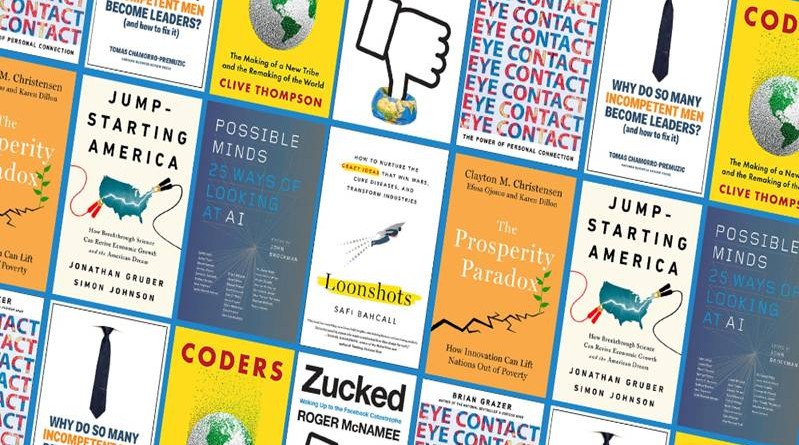10 Business Books You Need to Read in 2019By Leigh Buchanan, Inc
When it comes to most-anticipated business books, Win or Die: Leadership Secrets From Game of Thrones is the one to beat, if endless Quora debates are anything to go by. We don’t know much about that entry, which comes out in March. But here are 10 other titles that have us intrigued. They include new offerings from business celebrities Clayton Christensen, Simon Sinek, and Marcus Buckingham–and one from Oscar-winning producer Brian Grazer, who wants to look deep into your eyes.
January
1. The Prosperity Paradox: How Innovation Can Lift Nations Out of Poverty, by Clayton M. Christensen, Efosa Ojomo, and Karen Dillon
Poverty is arguably mankind’s most intractable problem. Christensen, a Harvard professor and originator of the concept of disruptive innovation, here argues for a new focus: not on eliminating poverty but rather on creating lasting prosperity. He urges entrepreneurs to pursue the transformative power of “market-creating innovations” that spawn jobs, profits (which can be reinvested in infrastructure and public services), and cultural change, often through democratizing consumer access. Such innovations, en masse, create the foundation beneath many wealthy economies, Christensen says. They can lift up developing nations as well.
February
2. Possible Minds: 25 Ways of Looking at AI, by John Brockman (editor)
At the highest level, debate about artificial intelligence often devolves into scenarios utopian or dystopian. Will machines make human beings the best they can be, or render them obsolete? Should we trust something potentially smarter than us? What is humanity’s role in a world ruled by algorithms? Brockman, founder of the online salon Edge.org, corrals 25 big brains–ranging from Nobel Prize-winning physicist Frank Wilczek to roboticist extraordinaire Rodney Brooks–to opine on this exhilarating, terrifying future.
3. Why Do So Many Incompetent Men Become Leaders? (And How to Fix It), by Tomas Chamorro-Premuzic
Women generally outperform men as leaders, research shows. So how come there aren’t more of them? One reason is our association of leadership with such undesirable, traditionally masculine qualities as self-absorption and overconfidence, which somehow translate as strength and charisma. Organizations are wrongheaded when they worry about lowering standards to advance more women, argues Chamorro-Premuzic, a professor of business psychology. Instead, they should focus on raising standards for men.
4. Zucked: The Education of an Unlikely Activist, by Roger McNamee
McNamee, an early investor in Facebook and a mentor to Mark Zuckerberg, watched with horror the relentless revelations of how Russia and other bad actors manipulated the social network to cause vast societal harm. Disillusionment followed as the company’s leaders downplayed the problem. Thwarted in attempts to persuade Facebook’s leadership to mount a meaningful response, McNamee has become a vocal critic of the business model, the culture, the technology, and the attitudes that created the crisis. Zucked is an angry-sad insider’s account and meditation on what it will take to protect democracy.
March
5. Loonshots: How to Nurture the Crazy Ideas That Win Wars, Cure Diseases, and Transform Industries, by Safi Bahcall
Big breakthroughs require two things. First, an idea so audacious it is widely dismissed. Second, a large group of people capable of transforming that idea from impossible to inevitable. The success of that journey depends on “phase transitions”: the scientific principle whereby small changes in structure–comparable to changes in temperature that cause water to freeze or become liquid–make people more or less open to disruptive thinking. Bahcall, a physicist and entrepreneur, explains how to optimize organizations so they don’t kill their most disruptive darlings.
6. Coders: The Making of a New Art and the Remaking of the World, by Clive Thompson
Most of us don’t go an hour without using software. So those who create it are of intrinsic interest. Thompson, a writer for The New York Times Magazine and Wired, presents a historical, psychological, and cultural investigation of programmers in all their optimization-obsessive, bug-battling glory. (Thompson himself does some programming in the course of the book.) The word “art” in the title isn’t incidental: The book considers what beautiful coding looks like and what it can achieve, as well as the moral quandaries posed by tech titans’ escalating growth and power.
April
7. Eye Contact: The Power of Personal Connection, by Brian Grazer
Grazer is the co-founder, with Ron Howard, of Imagine Entertainment and an Oscar winner for the film A Beautiful Mind. So when he proclaims that something as simple as eye contact has a profound effect on relationships and the outcomes of interactions, you want to know more. The producer bemoans the power of screens to draw eyes downward, and urges readers to seek intimacy and connection in conversations–and not just those for which they have agendas. Grazer’s star quotient means he’s gazed into some formidable peepers. The book describes encounters with, among others, Bill Gates, Eminem, George W. Bush, and Kate Moss.

8. Jumpstarting America: How Breakthrough Science Can Revive Economic Growth and the American Dream, by Jonathan Gruber and Simon Johnson
As Amazon expands into two regions already teeming with jobs and economic activity, this book examines the lopsided prosperity that leaves some parts of the country struggling while others–typically crowded enclaves on the coasts–thrive. Things were different in 1940, when government investment in R&D began producing breakthroughs in science and technology, from jet engines to life-saving medicines, to benefit everyone. MIT economists Gruber and Johnson think it’s time to revisit that playbook.

9. Nine Lies About Work: A Freethinking Leader’s Guide to the Real World, by Marcus Buckingham and Ashley Goodall
Conventional management wisdom exists to reinforce the organization’s control over individuals, writes Buckingham, widely popular for his look-to-your-strengths approach to personal development. Among the “lies” he debunks are some sacred cows. For example, people crave feedback; people have potential; work/life balance is something we should all aspire to; and leadership is a “thing.” (Some of us have been questioning that last one for years.) Buckingham urges freethinking leaders to toss off the straitjacket of dogma in favor of “the glorious messiness” of individuals working together.
June

10. The Infinite Game, by Simon Sinek
A checkers match and the Super Bowl are finite games. Someone wins. Someone doesn’t. Business, by contrast, is a ceaseless endeavor in which playing field, players, and rules change constantly. Leaders require not just the resources but also the will to win such contests, organizational expert Sinek explains. That means the courage to stand up to short-term thinkers (Wall Street, popular sentiment) in defense of your just cause, an open-playbook strategy visible to all, and the understanding that, ultimately, we are competing against the best version of ourselves.
Note: This article contains affiliate links that may earn Inc.com a small fee on purchases originating from them. They do not influence editorial decisions to include mention of any products or services in this article.




